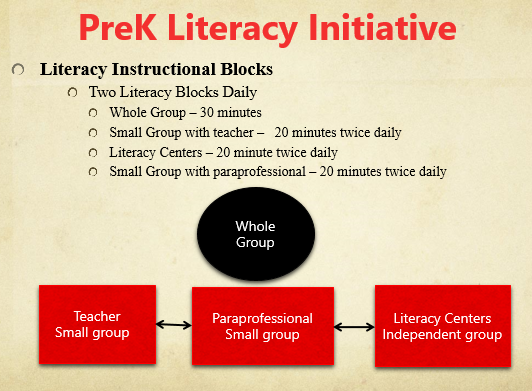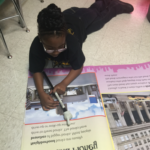This is the first post in a six-part series recognizing the winners of the Tennessee’s Best and Alabama’s Best contests. We hope these great examples of best practices in Tennessee and Alabama public education inspire you as they did us.
“Teaching a child to read is one of the most important jobs an educator has.”
These are the words of Jennifer Jordan, Director of Literacy and Instructional Interventions at Lauderdale County Schools in Ripley, TN. Lauderdale County Schools was recognized by LEAN Frog and the Tennessee Organization of School Superintendents (TOSS) as a Runner-up Winner in the Inaugural “Tennessee’s Best K-12 Practices” Contest. Their “Extended Literacy Initiative (ELI) – Meeting the Needs of All Students” entry details their plan to improve the lives of at risk students by providing targeted assistance to struggling readers.

The Challenge:
- Children of poverty often enter kindergarten with oral language and emergent literacy skills two to three years behind peers (Fielding et al, 2011, Hart & Risley, 1995)
- For these students who are significantly behind their peers, a typical one-year gain is not enough to effectively close the literacy gaps.
- For students to achieve literacy at accelerated rates, administrators and teachers must adjust their daily and weekly schedules to significantly increase the amount of time for small-group literacy instruction” (Canady and Canady, 2012).
Lauderdale County’s Response:
The district launched their Extended Literacy Initiative (ELI) to address the fact that many of their students are at a significant risk of reading failure due to limited early literacy experiences. The ELI action plan has two-pronged approach.

- Innovative scheduling to increase the amount of time for literacy. For example, Pre-K students receive 150 minutes of literacy instruction daily.
- An emphasis on increasing the rigor and fidelity of literacy instruction. In the K-3 Reduce Group Instruction, students receive targeted phonics instruction so they can reach or exceed grade level exit expectations. During the extension labs, students practice skills learned during whole group and/or reduced group instruction.
The results have been impressive.
- 77% of pre-K students met the developmental benchmarks in all seven areas measured by the Phonological Awareness Literacy Screening (PALS-Pre-K)
- Students are entering first grade with much better decoding skills than previous years
- SAT-10 data has shown significant gains in reading scores (word reading, word study skills, reading comprehension) for grades K-2 over the last three years.
Superintendent Shawn Kimble points to an important benefit of the ELIs–informed and engaged community members. As he remarked, “Through the tireless efforts of our teachers and administrators, students in our county have made tremendous progress with their skills in literacy. These efforts have brought about community awareness concerning the importance of daily reading to and with children at home.”
Why we Like this Entry:

While many schools and school systems have taken on the poverty-literacy gap challenge, the intentional nature of Lauderdale County’s ELIs has proven extremely successful. They understand the critical importance of students learning to read by the end of the 3rd grade and have structured their school day to meet that need. They also have involved the community. The school system and the community sponsor a “Lace Up for Literacy” 5K walk/run to bring awareness to Tennessee’s “Read 20” campaign.
Perhaps Jennifer Jordan said it best, “Our goal for all students in Lauderdale County is to experience success in both school and the future. Literacy is the avenue by which our students meet this goal. Not only do we want our students to be proficient readers, but we also want them to find joy in reading that will continue throughout their lives.”